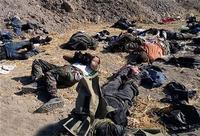-
California agriculture faces greatest water loss ever seen
California produces nearly half of U.S.-grown fruits, nuts, and vegetables, and nearly a quarter of the nation’s milk and cream. Across the nation, consumers regularly buy several crops grown almost entirely in California, including tomatoes, carrots, broccoli, almonds, walnuts, grapes, olives, and figs. Researchers show that California agriculture is weathering its worst drought in decades due to groundwater reserves, but the nation’s produce basket may come up dry in the future if it continues to treat those reserves like an unlimited savings account.
-
-
California crippling drought linked to climate change: Scientists
The extreme atmospheric conditions associated with California’s crippling drought are far more likely to occur under today’s global warming conditions than in the climate that existed before humans emitted large amounts of greenhouse gases. Researchers used a novel combination of computer simulations and statistical techniques to show that a persistent region of high atmospheric pressure hovering over the Pacific Ocean that diverted storms away from California was much more likely to form in the presence of modern greenhouse gas concentrations.
-
-
Assad retains secret caches of chemical weapons: Israeli intelligence
Despite committing to dismantle and give up its chemical weapons – Syria was in possession of the world’s largest chemical weapons stock — President Bashar al-Assad’s regime still maintains a “residual” chemical weapons capacity, consisting of a few tons of the proscribed materials. Israel’s intelligence community has concluded that the Assad regime has decided to keep this reduced, but still formidable, chemical weapons capability, and has successfully concealed it from the inspectors of the UN chemical weapons watchdog who, a few weeks ago, have declared the chemical disarmament of Syria to be officially complete. Israeli defense officials believe that these sarin gas weapons would likely be deployed if the Assad regime faced an imminent threat to its survival. The Syrian regime is continuing to use chemical weapons which were not covered by the U.S.-Russian chemical weapons disarmament agreement, especially chlorine gas.
-
-
Cost of U.S. war on ISIS reaches $780 million
The cost of the war against the Islamic State (ISIS) Islamist group has totaled at least $780 million, according to a new estimate, as U.S. warplanes and drones continued to strike Isis positions in Iraq and Syria on Monday and Tuesday. Defense Secretary Chuck Hagel said on Friday that the U.S. military is spending up to $10 million a day and will likely request more money from Congress to fund the war. The attacks on ISIS began 8 August, and before they were expanded to include targets in Syria, the Pentagon estimated the daily war costs at $7.5 million.
-
-
$3 million in grants for three pilot projects to improve online security, privacy
The National Institute of Standards and Technology (NIST) the other day announced nearly $3 million in grants that will support projects for online identity protection to improve privacy, security and convenience. The three recipients of the National Strategy for Trusted Identities in Cyberspace (NSTIC) grants will pilot solutions that make it easier to use mobile devices instead of passwords for online authentication, minimize loss from fraud and improve access to state services.
-
-
Obama: U.S. intelligence underestimated ISIS strength, overestimated Iraqi military's resilience

President Barack Obama on Sunday said that the U.S. intelligence community had underestimated Islamic State (ISIS) strength and level of activity inside Syria, which has become “ground zero” for jihadist terrorists worldwide, while overestimating the ability of the Iraqi army to fight such militant groups. Obama’s admission that ISIS succeeded in setting up its bases in Syria and Iraq without being noticed by U.S. intelligence may embolden Republican hawks such Senators John McCain (R-Arizona) and Lindsey Graham (R-South Carolina) who have been complaining for months that the administration was being too passive in its approach to the Syrian civil war.
-
-
ISIS, al-Nusra reconcile as Syria air strikes continue

Under continuing strikes by U.S. and coalition air forces, ISIS moved toward a new alliance with Syria’s largest al-Qaeda-affiliated group. Jabhat al-Nusra, which has been at odds with ISIS for more than a year now, was also subjected to U.S. air strikes which killed scores of the group’s members. Many al-Nusra units in northern Syria now appear to have reconciled with ISIS, following months of bitter clashes between the two groups.
-
-
New DOJ pilot program aims to deter Americans from joining terrorist groups
Boston, Los Angeles, and Minneapolis will host the Justice Department’s (DOJ) pilot program aimed at deterring Americans from joining terrorists groups, particularly those fighting in Syria and Iraq under the Islamic State (IS) and Somalia under al-Qaeda-affiliated al-Shabaab. The program will rely on prevention and intervention initiatives.
-
-
U.S. strategy for fighting ISIS includes outreach to Muslims-American communities
The White House is planning a summit in October to consider domestic extremism – a summit which will include Muslim faith-based organizations, mental health providers, social services groups, and youth-support organizations. The leaders of U.S. security services agree that Muslim-American communities should be seen as the “front lines” against the efforts of terror groups to recruit impressionable youth.
-
-
Departures, vacancies continue to hobble DHS
The rate of senior level departures at DHS has increased in recent years, and some say that as a result, the department is unable to stay ahead of emerging threats, including potential terrorist and cyber incidents. According to the FedScope database of federal employees administered by OMB, between 2010 and 2013, departures of permanent DHS employees increased by 31 percent, compared to a 17 percent increase for the entire federal workforce.
-
-
Tension between humanitarian ideals, fear of terrorism in European asylum decisions
New research has found that European states that experienced a terrorist attack on their own soil since 1980 were less likely to grant asylum to refugees. The study also found, however, that on the whole, concerns over terrorism in Europe have not eroded underpinnings of the Geneva Convention’s principles regarding asylum admission.
-
-
Better regional coordination for port security
In the days following the 9/11 terrorist attacks, first responders in the Northeast were suddenly responsible for monitoring potential targets, including a military base, nuclear power plants, and a deep water port. Emergency teams soon found out that they were ill-equipped to coordinate with one another. That realization prompted better organization among regional first responders.
-
-
South Carolina reflects on Hurricane Hugo anniversary
The state of South Caroline has just eyed the twenty-fifth anniversary of Hurricane Hugo – the Category 4 storm that hit the coast on 21 September 1989 with sustained maximum winds of 138 mph. Many in the state still honor that event, and live with the memory of the severe coastal damage due to drastic storm surges and the forty-nine lives lost during the disaster. The storm also left 60,000 people homeless, with 270,000 temporarily unemployed and 54,000 residents seeking monetary assistance. Extending far beyond that were many others who did not have power for two weeks or longer.
-
-
A first: Jury finds bank guilty of financing terrorism
In a major development on the terrorism financing front, a U.S. jury found Arab Bank Plc liable for providing material support to Hamas and ordered the bank to compensate nearly 300 Americans who are either victims or relatives of victims of at least two dozen attacks tied to Hamas in Israel and the Palestinian territories.
-
-
U.S. starts air strikes on Syria as shadowy new threat emerges

The United States has commenced major air operations against the Islamic State (IS) in Syria. Why has the United States suddenly expanded the air war by going for the heart of the Islamic State’s power base in Raqqa, Syria? The answer almost certainly lies with what has happened in the past six weeks in the ongoing air war in Iraq. There, more than 190 air strikes on close to 250 targets have done little more than blunt some of IS’s recent advances, and have conspicuously failed to stop the group from making gains elsewhere. More generally, the new government of Prime Minister Haider al-Abadi has so far failed to convince key Sunni clans in western and north-western Iraq that it will run a more inclusive regime; as a result, clan leaders are far too suspicious to work alongside government forces. In the short term, Washington is presenting this rapidly accelerating war as a decisive action to permanently cripple IS. It may well look like a success at first — but that will almost certainly be highly misleading. In reality, the Third Iraq War, now extended into Syria, is merely in its very early stages.
-
More headlines
The long view
Factories First: Winning the Drone War Before It Starts
Wars are won by factories before they are won on the battlefield,Martin C. Feldmann writes, noting that the United States lacks the manufacturing depth for the coming drone age. Rectifying this situation “will take far more than procurement tweaks,” Feldmann writes. “It demands a national-level, wartime-scale industrial mobilization.”
No Nation Is an Island: The Dangers of Modern U.S. Isolationism
The resurgence of isolationist sentiment in American politics is understandable but misguided. While the desire to refocus on domestic renewal is justified, retreating from the world will not bring the security, prosperity, or sovereignty that its proponents promise. On the contrary, it invites instability, diminishes U.S. influence, and erodes the democratic order the U.S. helped forge.
Fragmented by Design: USAID’s Dismantling and the Future of American Foreign Aid
The Trump administration launched an aggressive restructuring of U.S. foreign aid, effectively dismantling the United States Agency for International Development (USAID). The humanitarian and geopolitical fallout of the demise of USAID includes shuttered clinics, destroyed food aid, and China’s growing influence in the global south. This new era of American soft power will determine how, and whether, the U.S. continues to lead in global development.
Water Wars: A Historic Agreement Between Mexico and US Is Ramping Up Border Tension
As climate change drives rising temperatures and changes in rainfall, Mexico and the US are in the middle of a conflict over water, putting an additional strain on their relationship. Partly due to constant droughts, Mexico has struggled to maintain its water deliveries for much of the last 25 years, deliveries to which it is obligated by a 1944 water-sharing agreement between the two countries.
How Disastrous Was the Trump-Putin Meeting?
In Alaska, Trump got played by Putin. Therefore, Steven Pifer writes, the European leaders and Zelensky have to “diplomatically offer suggestions to walk Trump back from a position that he does not appear to understand would be bad for Ukraine, bad for Europe, and bad for American interests. And they have to do so without setting off an explosion that could disrupt U.S.-Ukrainian and U.S.-European relations—all to the delight of Putin and the Kremlin.”
How Male Grievance Fuels Radicalization and Extremist Violence
Social extremism is evolving in reach and form. While traditional racial supremacy ideologies remain, contemporary movements are now often fueled by something more personal and emotionally resonant: male grievance.
